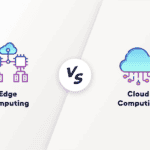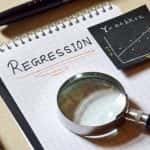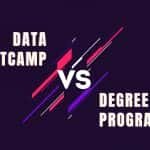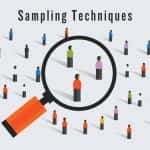The process of becoming a data scientist is complex, but here we have broken it down into simple, manageable steps which can transform anyone into a data scientist.
Becoming a data scientist is a long and entwining process, which is bound to extend lifelong with the frequency of breakthrough innovations and emergence of cutting edge technology. It is strongly advised to start implementing one’s new learnings from the get-go and to persist in approaching problems analytically.
The proposition may seem quite arduous for a beginner, who is looking to start from the scratch. There are umpteen resources to learn from online, which include MOOCs on various platforms and bootcamps with varying price tags, which leave one puzzled and gasping with overchoice. The seemingly unending trail of things-to-learn may even kill your motivation and instil a sense of helplessness and vanity.
However, we believe it does not have to be this way! Every individual can have a unique learning trajectory, owing to an assortment of distinctive factors (that include, among other things, learning habits and the appetite to learn more) and current designation (a student in college, a passout-learner, a person working in a related role etc). But, with a similar end-goal, following are a few checkpoints you’d fancy ticking, in that order.
Penchant for the domain
Checking whether your expectations and goals are aligned with what the discipline needs you to do is a must. Data science can be internalized irrespective of one’s prior education background but it isn’t everyone’s cup of tea. More on it can be found here.
Learning and implementing key concepts

The next step is to start learning the relevant concepts that one would be implementing and the tools that will help facilitate this implementation. As mentioned before, it is prudent to experiment one’s learnings and to find manifestations of the theory in real-life.
For instance, once you know about combinatorics, it’s a fun exercise to work out the number of ways you can set your device’s screen lock and find the fallacy in moribund movie scenes where the protagonist is able to work it out correctly despite being under the pump.
To become a data scientist, it is indispensable to have a good grasp of key essentials like statistics, probability, linear algebra, a programming language (where Python is the número uno choice for many industry experts), libraries (Pandas, NumPy, StatsModels, SciKit Learn etc.), machine learning’s theory and implementation and visualization of these in the world around you.
While there is no dearth of quality resources on the web, it is an uphill task to start. Also, practicing what one learns and getting cross-checked by questions do a world of good to the learning process. This is where Pickl.ai’s courses will assist you with learning and understanding these essentials, all at one place. A good start will set you up nicely for your data science journey, while providing guidance from the horse’s mouth.
You’d be stimulated to broaden your outlook and to consider offbeat illustrations to improve your critical understanding. With express doubt-clarification and live classes, achieving an impeccable grasp is ensured to be fun!
Coming back to examples, it would be a good idea to implement regression on topics beyond the quintessential SAT v/s college grades example. It is empowering to invigorate claims on cases like “incidence of lung cancer with smoking rates” and to lay bare the ones on the lines of “5G radiations and the human apocalypse”.
Building projects

As you make it a habit of reinforcing theoretical lessons into practice and keep typing code, it becomes increasingly natural to increase the scope of your work once the course you underwent comes to an end. Platforms like kaggle can be used for importing large, relatively-clean databases, which can then be used for answering problem statements.
You can enrich the exercise further by answering questions that you set for yourself. In fact, this is the modus operandi for real practitioners, who are not supplied with explicit questions. You can gradually shift to bigger datasets, with more discrepancies and irregularities. This is in line with industry practices, where data scientists set out to clean the dataset first, which in itself is strenuous and takes up the lion’s share of their time.
You can also explore other platforms like the UCI. Datasets used by international organizations like the World Bank, OWID and media agencies like NY Times are also made available publicly and can be downloaded from GitHub or their websites, as applicable. This will also ensure that you are exposed to various kinds of scenarios.
Simultaneously, upload your findings online to showcase your portfolio. This will enable association with other budding and experienced data scientists, which will also give you a glimpse of the wide, interconnected era of today. It will also help you to draw the attention of prospective recruiters and attaching the same on your résumé.
Find your community

Back in childhood, it must have been an otherworldly experience to learn anything from history to grammar together, both in the classroom and outside its auspices. The promise of agility in business environments may seem bleak in front of the spirit of healthy competition that ensues when you have enthusiastic colearners.
Bringing data science into perspective, it is helpful to receive guidance from those in the knowhow, especially with the arduousness and length of the journey. Online forums provide you with a chance to clarify everything from everyday issues to concerns about the way your career is shaping up. Notable ones include r/datascience, StackOverFlow and Quora.
In our course, we take care of this aspect by allowing learners to communicate freely with their peers and instructors. Doubts pertaining to the topic at hand are addressed by a bustling, heterogeneous community which is supplanted by the live discussion sessions.
Gaining experience

Interning in roles of data/business analyst is a great way to break into the market. For students, this is also their introduction to the corporate world, which in itself, is inherently monumental and memorable for one’s career.
Working professionals who are data analysts are able to transition into data scientists since they have had the experience of working on similar problems. They are adorned with various pertinent skills beforehand, which holds them in good stead for the change.
The same holds for newcomers. While cracking a data scientist role without prior experience is improbable, working in a related profile augurs well. One also gets to communicate with data scientists firsthand, which is an additional advantage.
This also applies to switching from other allied responsibilities, that include being a data engineer, business analyst, data and analytics manager, database administrator, data architect etc.
Conclusion
These steps are iterative, just like the learning process. One needs to keep learning and advancing, in the current age and time in order to stay abreast with the trends. New projects become a way of life, just like new lessons, changing responsibilities and switching firms once in a while.
Along with the aforementioned deliverables, on Pickl.ai, you’d get more; more than the run of the mill data science courses. There will be an opportunity to obtain career advice from practicing experts, along with résumé review, mock interview and ideas for building projects. Head over to the course and sign up today!










